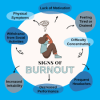As the year draws to an end, many people are doing a balancesheet of how the year went with some noting that they have gone through burnout, a situation which has far-reaching consequences if not well managed.
CRTV Web caught up with a Neurologist and Counsellor, Dr Leonard Ngarka, who shed some light on burnout and how to avoid and manage it.
What is burnout, and how does it affect individuals?
Dr Leonard Ngarka: Burnout is a state of chronic physical and emotional exhaustion, which usually arises from prolonged stress. It can lead to decreased motivation or productivity, and in fact, affect the overall well-being of an individual. The people who experience burnout usually feel overwhelmed and unable to cope with their usual daily tasks, and this affects significantly their personal and professional lives. For instance, today, I was called by one of my patients, somebody who is very hardworking. He has some deadlines he has to meet up with, say, in a month’s time, and normally, those are things which this guy can complete in one week, but he says he is unable to sit on his laptop. His head is just crowded. He sits there and stares at his machine until he gets up and goes and sleeps. For two weeks now, he’s not been able to do anything because he’s overwhelmed. Those are typical signs of burnout. That means what the person could do in very little time, suddenly, he’s unable to carry it out because of that state of exhaustion.
What are the common causes and consequences of burnout?
Dr L.N: The common causes of burnout are increased workload… when we have excessive work demands, maybe we have unrealistic expectations, that can usually lead the individual to feeling overwhelmed. Sometimes it could also come from lack of control, that means you feel powerless or helpless at your job. Sometimes it could be insufficient rewards…you are doing a very good job but you are not getting the rewards that you should for the work that you are doing or sometimes when we don’t have also a good balance between work and life because it’s important to have sufficient rest after work, and when we don’t have that, it could lead to burnout.
What are some of the consequences of this situation?
Dr L.N: They are numerous. It could lead to physical health issues, like it gives us increased chronic conditions like fatigue, sleep disorders, or it could also cause mental health issues. It could also cause an increased likelihood of anxiety and depression, or even reduced self-esteem. Moreover, it could even have an impact on the reduction in job performance, like the story I recounted earlier, we have somebody who is feeling burned out… he’s not able to carry on his responsibilities… the objectives which he fixed, he’s unable to realise them within the time that he earmarked. This leads to reduced productivity, creativity, and engagement and sometimes it can even have a strain in relationships because individuals who suffer from burnout will withdraw themselves from social environments. They will not be able to interact with their friends and loved ones, and this will lead to difficulty in maintaining relationships.
How can we prevent or mitigate this?
Dr L.N: The first thing will be for us to try as much as possible to set realistic goals. I would say that set goals that are achievable and try to prioritise your workload in a very effective manner. Practise self-care; carry on regular physical exercise; have good rest; have a balanced diet; make sure that you have good sleep – sufficient sleep in terms of quantity and quality. Try to establish boundaries, that means, create clear distinctions between work and personal time in order to keep yourself away from over-commitment. Also, seek support whenever you need it. For example, connect with colleagues, with friends, or other mental health experts, if you have any challenges in order for them to give you the support you need. You should also know the things that get you into exhaustion. Try to develop some coping mechanisms, like meditation or doing the things that you find pleasurable, like going out for a dance, going out for sporting activities, going out for choir practise, just anything that makes you feel better. Go to a quiet place, just go to nature or visiting. These are some of the things that can help you to manage burnout.
At what stages of life or career can someone experience burnout?
Dr L.N: Burnout can occur at any stage in your career, be it early, mid, or later. It is very common to women after they’ve given birth to children, especially women who work because they usually overwork and get caught up between managing the newborn, their families and also their jobs. So usually it’s a very critical period that needs to be managed very carefully.
What are some of the signs or symptoms of burnout?
Dr L.N: We can have chronic fatigue, sleep disorders with insomnia, headaches and maybe frequent illness. There are also emotional symptoms like some form of detachment from colleagues, decreased sense of accomplishment, increased irritability, mood swings, a feeling of helplessness or hopelessness. There could also be withdrawal from social activities, decreased productivity and performance, increased absenteeism, lateness to work, or even changes in appetite. Sometimes people with burnout, have increased desires for things that normally they have no interest in. They just develop interest in consuming alcohol or smoking excessively as a way of managing their stress, or sometimes some people develop increased appetite and they eat in huge quantities as a way of managing their stress and all of these are unhealthy for the human body.
What strategies or advice would you recommend for someone experiencing burnout to regain a healthy work-life balance and overall well-being?
Dr L.N: Let your boss know when work is too much for you and you can’t do it all by yourself. You can assign someone to assist you because it is your health that is at risk when you try to take so much than you can actually do. Overall, invest in your hobbies. Make time to do the activities that you find interesting… those activities that give you joy and fulfillment outside work. Lastly, I would advise that we should learn to communicate openly. Discuss your workload and your stressors with your supervisors, your colleagues, and try to explore means of adjustments that can be made in order to improve your efficiency or to improve your balance or how well you work.
Compiled by Eleanor Ayuketah Ngochi











